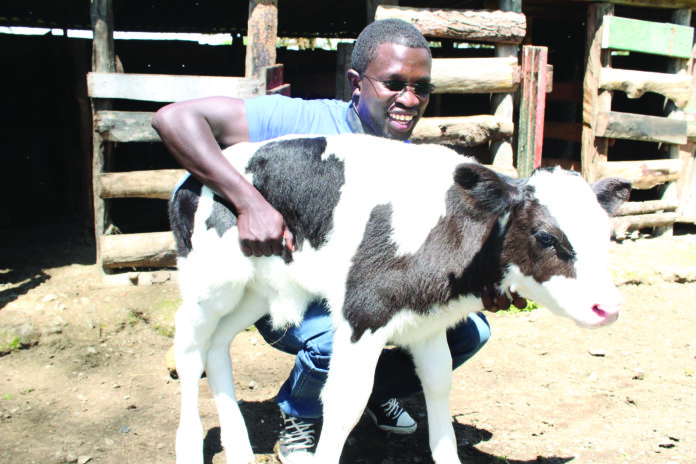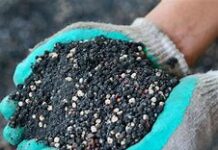The search for a domestic animal buyer or seller need not be daunting anymore, Cowsoko has a virtual marketplace for the trade
By Caroline Mwendwa
Having worked as an intern in training farmers, Victor Otieno had first-hand experience of what farmers need and invested on this idea to establish Cowsoko, which helps farmers sell and buy cows, goats, sheep and lately carmels and donkeys.
“Every time I went to the field to train farmers in various places I would come back and several people would be waiting to ask me where they can get good livestock from,” explains Otieno. This brought him to the realization that there was a market need, buyers need to be connected to the sellers on the ground, and being an IT enthusiast, the answer was right before him. He launched Cowsoko in the year 2015 and apart from linking buyers to sellers, Otieno used his experience and expertise to offer other services to clients registered in Cowsoko including training the farmers on how to best take care of their animals so that they can sell them at higher prices and buyers get value for their money.
How Cowsoko works
Cowsoko is an application which is web based and mobile phone based. The web based app is mostly used by farmers who want to check the kind of livestock on sale, while the mobile phone app is used by sellers who take pictures of the animals they want to sell, upload and share them on the platform. Once there is a buyer all sellers are notified of the buyer by the app.
The people mostly targeted by Cowsoko are those living in the urban and have a piece of land in the rural especially the middle class.
“Our model is very beneficial both to sellers and buyers. To start with, most buyers think that buying the cow is the first step towards dairy farming. Unknown to them is that this ought to be the third stage.” When dealing with buyers, the process starts by visiting the buyer and guiding on the house structure for the cow and further training the buyer on various things before they even purchase the cow. “For instance, we advise the buyer to do a price list of things they need to buy, and come up with a business plan that shows at what point certain things are likely to be experienced.”
One other very important thing Cowsoko does for its clients, is linking them to seasoned dairy farmers to visit their farms and learn on site various things among them being what to expect as a dairy farmer.
Cowsoko has customized services for bulk buyers, whereby, a buyer wishing to purchase a herd of cattle, states an average specification of the kind of animals they want to buy, and the Cowsoko team searches for a buyer offering such kind of animals and refers a field lord to the site to assess the livestock and see whether it matches the requested type. “We have a field lord in most parts from where we get sellers of livestock, who withhold the livestock before they are transported to the buyer,” says the Animal Science graduate.
One major advantage of working with Cowsoko is that not only are things verified for the buyer and the buyer prepared to start handling the animals once (s) he has bought them, but they also arrange for transport to the buyer. “We have trucks in several areas, even though they don’t belong to us, we have partnered with various logistics firms who provide the trucks for transport on demand.” Cowsoko is based along Ngong Road and has partners in Kinangop, Eldoret, Makueni and Isiolo.
Apart from live animals, Cowsoko is also dealing in beef, where they link beef cattle sellers and buyers. Donkeys are especially sold on this platform for beef. “One thing that has been hitting farmers hard is having to deal with brokers, who take advantage of them by buying their animals at very low prices and selling them to slaughters at very high prices. We intervene by educating farmers on how to value their animals comparing the weight of the animal and the price a kilo of meat goes for and computing these figures to settle on the value of the live animal.”
It is absolute convenience as the app also allows for the buyer to pay directly via M-pesa, once they have identified the ideal animal.
A job hub
Cowsoko has provided employment to 35 people already and has several other temporal staff members who work in support of the clients. “We are very keen in recruiting young graduates before they have even graduated from school.” Being an alumni of Egerton University, Otieno has had a good opportunity to share the dream with other young people pursuing courses on animal husbandry and other related courses. “We regularly go to the institution, and conduct training to groups of students from whom we recruit staff to Cowsoko.”
Hurdles
First, acquiring capital was a tall order. Otieno observes that there is a lot of talk about supporting entrepreneurs but the moment when someone badly needs the financial support they realise that it is not as easy as it sounded. The requirements for acquiring a loan for instance, are strenuous especially to young people who may not have property to offer as collateral. “If for example you are undertaking a venture to do with technology and the only collateral you can think of is a family property like land, the custodian of the title deed is likely to be someone of a different generation and whose decision of letting go the family fortune on a business idea they cannot relate to is unlikely.” As such therefore, how to get the startup capital can be a great ordeal.
Cracking through a new venture takes time especially one in which technology is involved in the most unlikely ways. This however did not deter Otieno from actualizing his idea. “People did not see how one can sell cows online but we strived to change this view into a possibility until they could trust the process.”
But the main challenge for Cowsoko is falling short of the demands of the buyers. “We are overwhelmed by buyers since there are so many people willing to buy but few sellers.” The main problem he says, is that most sellers are selling the least productive cattle while the buyers want the best. This poses a huge challenge in linking these two.
“In areas where there are no financial structures, this being a field involving cash transactions, handling the cash is a risky affair,” he says.
Otieno however clarifies that Cowsoko deals only with affordable livestock while ensuring quality. The most expensive animal should be Ksh 120,000.
Lessons learnt
As an entrepreneur leveraging on technology, Otieno says that there is a huge gap between what the internet projects and what the market needs. “Developers may be creating a highly complex and potentially beneficial app for farmers but until they place themselves at the level of the farmer, they are likely to come with an app unfit for farmers.
He also warns aspiring entrepreneurs that carrying the tag ‘entrepreneur’ may sound prestigious but there is so much effort and commitment that comes with success and the support systems are few. Nevertheless, his advice is that if one has a business idea, the best time to put it to action is now. “Just get started and don’t plan so much as things are likely to be totally different from what you project them to be.”
The secret he says is to have patience and not looking at the money. “People make the mistake of focusing on investors, hoping they will come and turn their business around, but forget that Kenya is different from many other developed countries where investors are looking for entrepreneurs with ideas. Just focus on your customers, build on them and they will take your business off the ground.”
The young agripreneur points out that even though farming may appear to be the panacea for unemployment in Kenya especially for the youth, there is need to assess the value chain in agriculture and see where the young people can best fit in. Unlike the older generation that can afford pieces of land and the patience to rear animals for income, a graduate may find it discouraging to start from that point. “However, they should not feel disempowered by this situation as there are many other ways to take part in agri-business without having to farm. This is because, the young people have the skills and knowledge that the older generation could be lacking. If they concentrated in value addition the entire chain could benefit.”



















